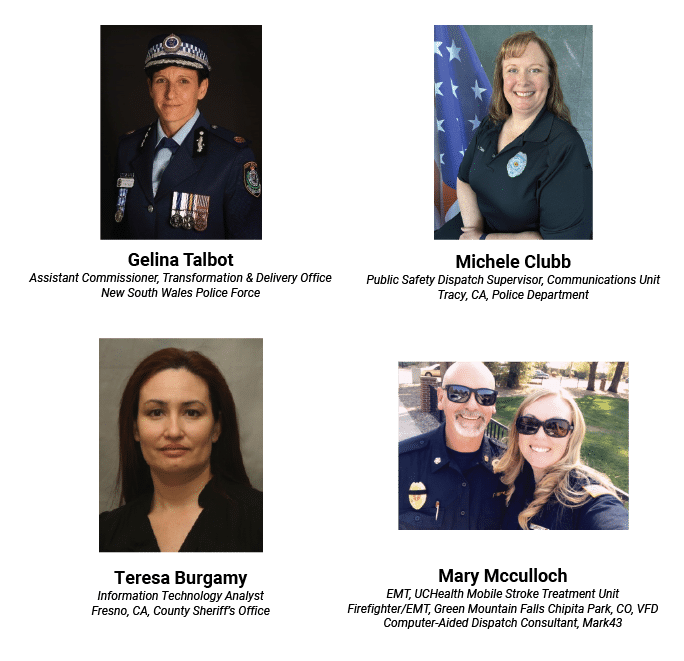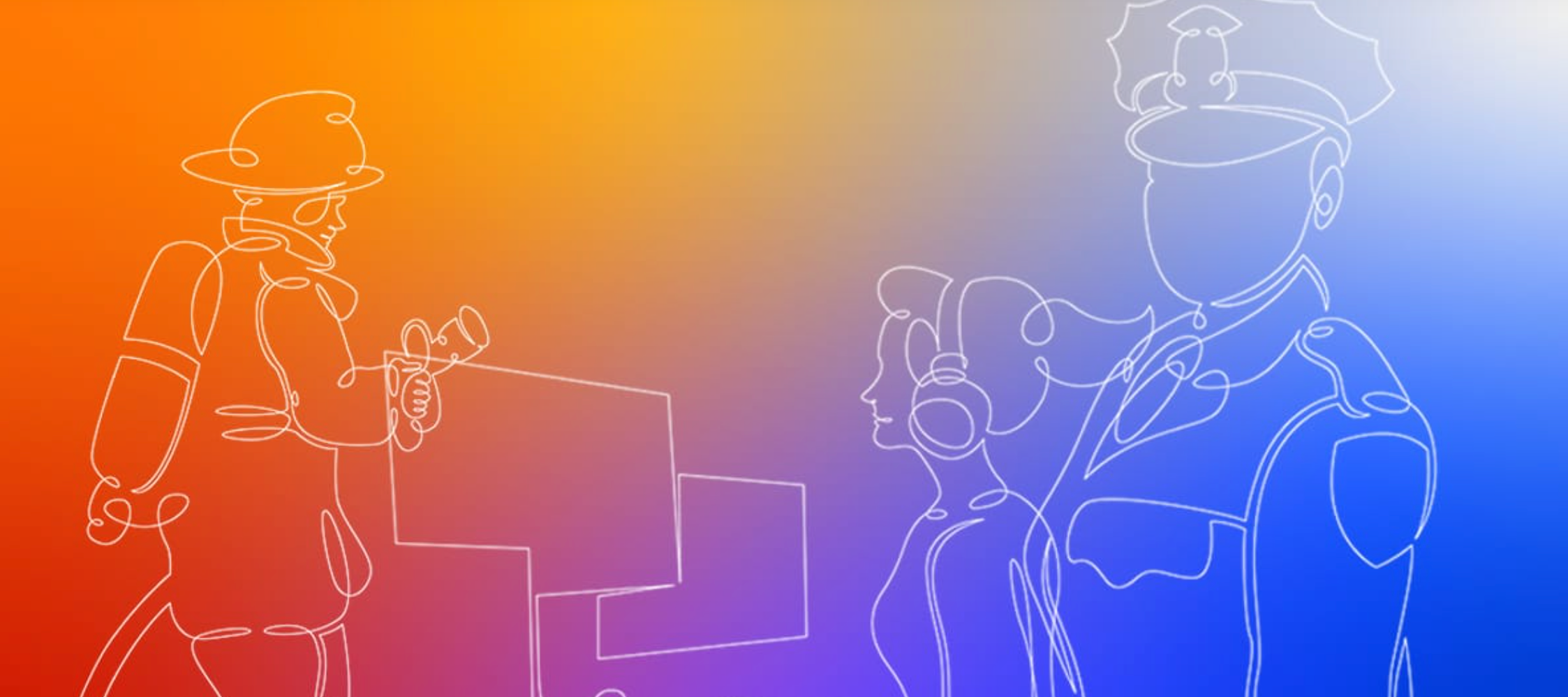A Q&A with Women First Responders
The first responder profession remains a male-dominated field. Only 12 percent of sworn law enforcement officers are women, and just three percent of law enforcement leadership is women. Four percent of career firefighters are women, while 11 percent of volunteer firefighters are women. While 32 percent of emergency medical service professionals are women, the only specialty within the first responder community that is majority women is telecommunicators — call-takers and dispatchers — which is 60 percent women.
Earlier this month, we talked to four women first responders worldwide about their experiences as women in public safety and how their gender impacted their careers.

Has being a woman impacted your career in public safety? If so, how?
Gelina Talbot, Assistant Commissioner, Transformation & Delivery Office, New South Wales Police Force:
“Early on in my career, I think the impact was more noticeable around opportunities for women across the New South Wales Police Force (NSWPF). However, since the mid-1990s, the opportunities for women have significantly grown as we have matured in our understanding of the value diversity brings to the workplace. That change had a very positive impact on my career with respect to promotion and the opportunity to have worked across various operational, specialist, and corporate areas of the NSWPF.
Now, as an Assistant Commissioner and senior executive member, I have the opportunity to sponsor and provide opportunities and support to other women so they can have fulfilling careers that benefit not only themselves but also the NSWPF and the communities we serve.”
Michele Clubb, Public Safety Dispatch Supervisor, Communications Unit, Tracy, CA, Police Department:
A majority of dispatchers are women, so I do not feel like I’ve been discriminated against as a woman.
Teresa Burgamy, Information Technology Analyst Fresno, CA, County Sheriff’s Office:
My law enforcement career started in the late 1990s as a police dispatcher for a small town, so yes, you could say being a woman impacted my career in public. Working in public safety as a woman has evolved tremendously over the years. When I first started, the role of women was typically expected to be a dispatcher or records clerk. Very few women worked as police officers or in any role of authority. I refused to settle for being the subject of the phrase, “you’re just a dispatcher.” I wanted more from this profession and for young women coming in behind me. I wanted our voices to be heard and to bring new, better technology to our dispatchers. This desire led me to become an instructor for Post Officers Standards and Training (POST), part of the POST Dispatch Committee, and move into the world of IT (Information Technology). Twenty-plus years later, the role of women in public safety has expanded immensely.
Mary Mcculloch, EMT, UCHealth Mobile Stroke Treatment Unit | Firefighter/EMT, Green Mountain Falls Chipita Park, CO, Volunteer Fire Department | Computer-Aided Dispatch Consultant, Mark43:
Being a woman in public safety has impacted and will continue to impact me for the rest of my life. Not only have I made lifelong friends that I consider family, but knowing that I have made a positive impact on at least one person in my life makes all of the blood, sweat, and tears worthwhile.
What is it like to work in a male-dominated industry?
Gelina Talbot: It can be difficult to navigate at times. For me, the first couple of years were the most difficult in learning to navigate the ‘expectation’ that women should conform and ‘fit into’ our male-dominated culture to be accepted. I have, however, been very lucky to have worked alongside very strong female and male role models who have provided sound advice and guidance throughout my career.
As a woman, when you work in a male-dominated industry, you must set clear expectations and parameters early in your career, and as you progress, you also have to quickly understand and become comfortable with your own leadership style and approach to doing business.
Michele Clubb: Since law enforcement, in general, is a male-dominated industry, I took that as a challenge to assert myself with confidence and knowledge in order to become and continue to succeed as a leader.
Teresa Burgamy: Public Safety has historically been male-dominated, but it is changing. I had a harder time in the female-dominated world of dispatching than working with men. Now that I’m in IT – another highly male-dominated field – my skills and experience are valued more as a contributor than a subordinate. I have a good team, and yes, at times, I have to remind a few of my peers that I do, in fact, have a brain. (Ha!)
Coming from a traditional Hispanic family, I know that in some cultures, male patriarchy is alive and well. I learned that attitudes are affected much more by culture than the workforce.
Mary Mcculloch: It is not easy working in a male-dominated industry. Being told that you can’t do something because of your size is not an easy thing to overcome. After countless failed attempts and more injuries than I’d care to admit, knowing my strengths and limitations is one of the most rewarding, yet one of the most difficult, things I’ve had to learn and overcome in a male-dominated industry.
What tools and skills have you developed to ensure your effectiveness and success?
Gelina Talbot: There are a number of strategies and skills that have helped me throughout my career.
One is being committed to my overall health and wellbeing. Our physical and mental fitness impacts how we show up at work and our energy, so I make sure it is a priority.
Lifelong learning and development are important, whether that’s through academic studies, internal courses, coaching, or reading widely. I believe to be successful today, you must treat life as a journey of discovery, and you must never stop learning and keeping up to date with emerging issues and changes that are occurring in your industry. I also rely on the principles of stoicism, which keeps me grounded around expectations and managing my approach to things that happen.
As for skills that have helped improve my overall effectiveness and achievement of success, the main ones are knowing and continually working on my leadership style, utilizing my strengths, and acknowledging opportunities to improve. I am a decisive, task-driven leader who knows how to set a compelling vision and roadmap for my teams to follow. This is an important skill for leaders because our people need to know the journey you are taking them on and why. I would also say that I have strong time management skills, utilizing an activity schedule and diary to manage what seems like a hectic schedule, and making sure I am spending the right amount of time on the right tasks. As for tools, I love any that make my life easier.
Finally, while not necessarily a skill, I strongly believe that as a leader you must spend time building professional relationships and partnerships with others. Success is a team sport, so I am very committed to building diverse and skilled teams to work with and developing strong relationships with our stakeholders and partners so we can achieve success that benefits the NSWPF and the people of New South Wales.
Teresa Burgamy: Remind myself not to carry a “chip on my shoulder,” leave the past where it belongs, in the past. The workplace for women has changed, and we must change with it. Learn from my peers (male or female), look for trades and tools I can glean from them to add to my own toolbox. Never stop learning!
What advice would you give to the women following your footsteps?
Gelina Talbot: My advice for other women is — never say no to career opportunities that challenge and stretch your potential.
People will appear in your life who are generous in opening the career elevator door for you or getting you a seat at the decision-making table. When those opportunities appear, step into the elevator (you can always pick what floor/level you get out on), and when you have a seat at the table, have a voice and make a difference.
Also, find great role models and, importantly, find a great coach and a sponsor. Many organizations provide mentoring, but my experience is that a coach will stretch your development further, and a sponsor will champion you and open the right doors for you to move through.
Lastly, always without exception, look after your physical and mental wellbeing.
Michele Clubb: Never give up, and there is always room for improvement, so take constructive criticism as a learning tool and better yourself.
Teresa Burgamy: My best advice is never settle. Set your goals, and don’t let anybody stop you. If something doesn’t seem right, do your research, arm yourself with knowledge, and help make a difference. Don’t fall into the rut of, “that’s just the way it is and always has been.”
Mary Mcculloch: To any woman who wants a career in fire or EMS, stand strong and proud. Know your limitations and communicate with your team. Those are some of the most important goals for success. You may not be able to lift a 300-pound ladder on your own, but using the tools you’ve learned will help you achieve great success. Fire and EMS isn’t just a career; it’s a lifestyle.
Unfortunately, some things just can’t be unheard or unseen. Talk about it. Don’t hold it in. There are plenty of people around you who have been through similar situations. It’s not just a physical aspect; there’s also a mental one. Know your limitations, be open, communicate, and strive to have the best career possible. Being calm in the center of a storm is one of the best feelings you could ever imagine.
Mark43 would like to thank these strong leaders and examples for their contribution to Women’s History Month and the continued legacy of women first responders. If you are interested in being featured in future Mark43 content, please contact us at community@mark43.com.

